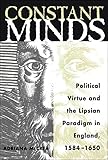Constant Minds : Political Virtue and the Lipsian Paradigm in England, 1584-1650 / Adriana McCrea.
Material type: TextSeries: Mental and Cultural World of Tudor and Stuart EnglandPublisher: Toronto : University of Toronto Press, [1997]Copyright date: ©1997Description: 1 online resource (338 p.)Content type:
TextSeries: Mental and Cultural World of Tudor and Stuart EnglandPublisher: Toronto : University of Toronto Press, [1997]Copyright date: ©1997Description: 1 online resource (338 p.)Content type: - 9780802006660
- 9781442673281
- 320/.0942/09032 22
- JC145.L8 M23 1997eb
- online - DeGruyter
| Item type | Current library | Call number | URL | Status | Notes | Barcode | |
|---|---|---|---|---|---|---|---|
 eBook
eBook
|
Biblioteca "Angelicum" Pont. Univ. S.Tommaso d'Aquino Nuvola online | online - DeGruyter (Browse shelf(Opens below)) | Online access | Not for loan (Accesso limitato) | Accesso per gli utenti autorizzati / Access for authorized users | (dgr)9781442673281 |
restricted access online access with authorization star
http://purl.org/coar/access_right/c_16ec
In response to the crisis provoked by the Wars of Religion in Europe in the sixteenth century, the Flemish philosopher Lipsius developed a synthesis of stoic morality and Tacitean political analysis called 'the Lipsian paradigm,' or neostoicism. The paradigm espoused the adaptation to prevailing political circumstances, the practice of 'mixed prudence,' (knowing the circumstances in which to apply deceit) and the use of historical example as a guide to contemporary action as political virtues.Constant Minds investigates the reception and use of Lipsian ideas in the moral, political, and literary culture of late-sixteenth- and early-seventeenth-century England through examination of the writings and activities of Walter Ralegh, Francis Bacon, Fulke Greville, Ben Jonson, and Joseph Hall. Adriana McCrea demonstrates how this continental school of thought permeated the political ideas of these English writers, and places her study in the contexts of the literary conventions of the humanist tradition, the political events of the time, and the activities and circles of the authors themselves. McCrea's study fuses intellectual history with political history and literary analysis, prompting new questions about the nature of English Renaissance humanism and political perception in England during the early modern period.
Mode of access: Internet via World Wide Web.
In English.
Description based on online resource; title from PDF title page (publisher's Web site, viewed 01. Nov 2023)


